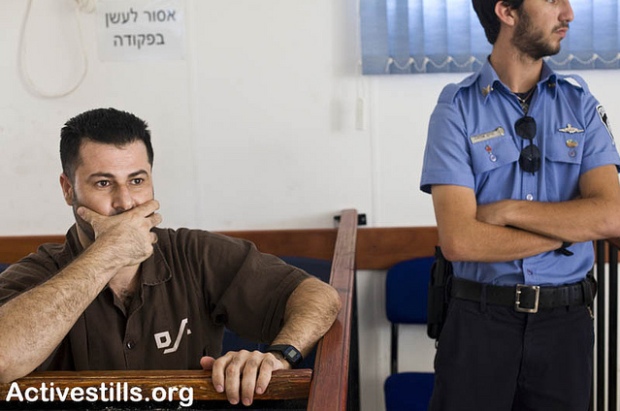Why did we choose Abdullah Abu Rahmah?
Because he has become the face of the grassroots, unarmed resistance movement to Israel’s security barrier; because he is the person who has raised international awareness not only of the devastation caused by the barrier, but also the existence of a well-organized, non-violent grassroots opposition movement – one that brings together Palestinians, Israelis and international supporters in a joint struggle. Because he is the answer to the question, “Where is the Palestinian Gandhi?” (answer: there are many; and they are languishing in Israel’s jails). Because he has never wavered in his commitment to non-violence – not even after his cousin Bassam Abu Rahmah was killed by a high-velocity tear gas canister shot by Israeli soldiers directly at his chest; nor after his cousin Adeeb Abu Rahmah was arrested and imprisoned for participating in weekly demonstrations against the barrier that separates the people of Bil’in from their own farmland.

The story:
Abdullah Abu Rahmah, a 39 year-old schoolteacher from the West Bank village of Bil’in, has since 2005 been the coordinator of the grassroots, unarmed Palestinian resistance movement to Israel’s security barrier in Bil’in. In Bil’in, as in many other Palestinian villages, the barrier appropriates village land, separating residents from their own farmland and orchards.
Particularly ironic in the case of Bil’in, is the fact that even the Israeli Supreme Court ruled in 2007 that the route of the barrier in the village is not justified by security concerns and that parts of it must be moved. So far, the State and the army have refused to carry out the court’s instructions.
Every Friday from 2005, Abdullah Abu Rahmah led a group of villagers, accompanied by international and Israeli activists in the direction of the barrier that bars the residents from their land. The villagers carry flags and placards as they chant slogans while walking toward the security barrier, where they were – and still are – met by Israeli armed forces in riot gear that force them back with tear gas, percussion grenades, skunk gas, rubber bullets, beatings, pepper spray and arrests.
In one video at a Friday demonstration in 2008, his cousin Adeeb Abu Rahmah made an emotional, heart-rending plea in broken Hebrew to the soldiers. “We are just a few people!” he said. “The Supreme Court said this is our land! Don’t you have a heart?!”
[youtube]http://www.youtube.com/watch?v=-St2hn_qPwE[/youtube]
More than one year ago, Abdullah Abu Rahmah was arrested by Israeli soldiers who raided his home in the middle of the night and took him away from his wife and three small children, locking him up in Ofer Military Prison. He was charged with stone-throwing and arms possession. The prosecution could not prove the charges; the security services film every demonstration from several angles, but were not able to produce a single image showing Abdullah holding a weapon or stone.
Nevertheless, the military court sentenced Abu Rahmah to one year in prison, for “incitement” and organizing “illegal demonstrations.” And so Abdullah served a full year in prison for coordinating unarmed resistance to the theft of his own land. And then, just as he was about to be released, having served his time in full, the military prosecution asked that his sentence be extended, on the grounds that he would go back to “inciting” again if he were released.
Several prominent figures have protested Israel’s treatment of Abdullah Abu Rahmah. Lady Catherine Ashton, foreign policy chief of the European Union, said that she was “deeply concerned,” calling him a “human rights defender” who was exercising his legitimate right to non-violent protest. Amnesty International, Human Rights Watch and the Israeli human rights organization B’tselem have all expressed their concern over his arrest and continuing imprisonment.
On 7 December 2010, Abdullah Abu Rahmah sat in a tiny, chilly, pre-fab caravan that constitutes a military courtroom at Ofer Prison, blinking slightly under the fluorescent lights and smiling shyly at the people who had come to support him. He wore a brown prison uniform and his legs were in metal shackles. Several European diplomats attended the hearing.
Just before the prisoner was brought in, one of the border police officers assigned to keep order in the courtroom approached Majida Abu Rahmah, Abdullah’s wife, and ordered her to move, along with her brother-in-law, from the front row to the back, so that she would not be able to make eye contact with her husband. Three European diplomats were told, to their horror, that they would have to vacate the back row for Majida and take the place she and her brother-in-law had been forced to give up – “for security reasons.”
In a letter relayed by his wife shortly after that court appearance, Abdullah Abu Rahmah wrote,
Despite the occupation’s constant and intense incitement to violence in Bil’in, we have chosen another way. We have chosen to protest nonviolently together with Israeli and international supporters. We have chosen to carry a message of hope and real partnership between Palestinians and Israelis in the face of oppression and injustice. It is this message that the occupation is attempting to crush through its various institutions including the military courts.
(click here to read the full letter)
After hearing arguments from the prosecution and the defense, the military judge said that he would look over the files and announce his decision soon. He did not say when. Meanwhile, Abdullah Abu Rahmah remains in jail. [Lisa Goldman]
Related Story:
